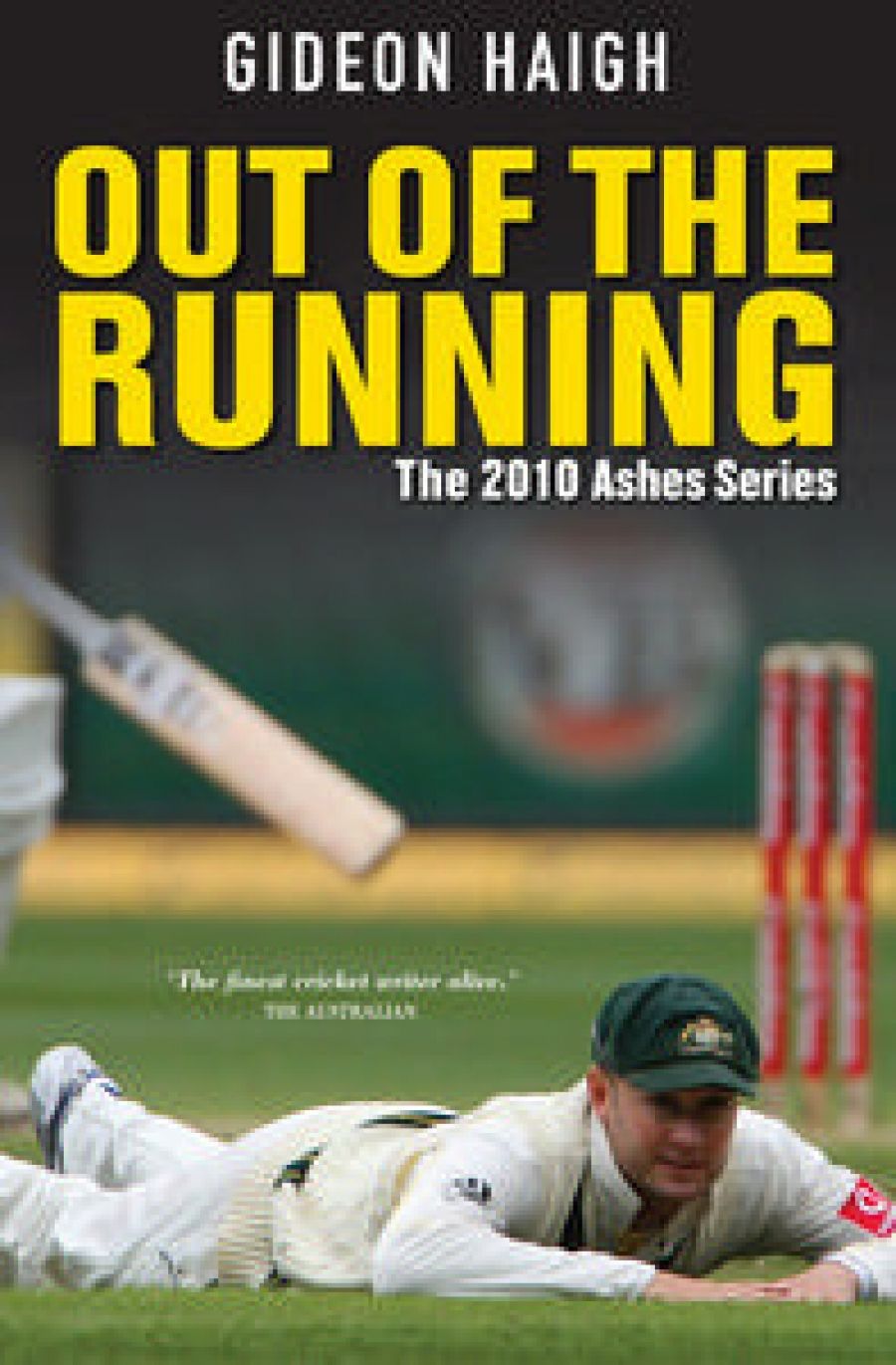
- Free Article: No
- Contents Category: Cricket
- Review Article: Yes
- Online Only: No
- Custom Highlight Text:
In the early 1990s the cricket tour book, like the western movie, seemed dead and buried. The formulas played themselves out around 1970, though the genre had a strong structure which allowed for fitful new interpretations. Direct telecasts of Test cricket and video highlights of series appeared likely to kill the tour book. Who needed to read about it when, having witnessed the games ball by ball, judgement could be passed again with the aid of electronic recording equipment? Yet a Test series offered a strong structure on which a skilful author could make interesting variations.
- Book 1 Title: Out of the Running
- Book 1 Subtitle: The 2010–11 Ashes series
- Book 1 Biblio: Viking, $29.95 pb, 285 pp
Gideon Haigh revitalised the tour book in 1995 with One Summer, Every Summer. Haigh, then aged twenty-nine, offered much more than just a ‘journal of record’ of a one-sided Ashes series, in which Mark Taylor’s Australians defeated Michael Atherton’s Englishmen three to one. Highlights of the book were not just the games themselves, but the diversions, notably Allan Border’s relationship with his coaches, Barry Knight and Bob Simpson; and comparisons of former Australian left-handed opening batsmen Arthur Morris and Bill Lawry. Minor ones concerned past Ashes heroes Derek Randall, Peter May, and John Edrich; a fifty-year reunion of the Australian Services Eleven; and one-time Australian twelfth man, Ian McLachlan. As the satirist John Clarke wrote in his foreword to One Summer, Every Summer:
The differences between Greek drama and a Test match is that in Greek drama everyone knows what is going to happen. But cricket contains its own elements, the same triumphs and tragedies, the same lessons, characters and capricious gods. Unlike the Greek chorus, however, the crowd has no script and no song.
Haigh brings a script and a song. An Ashes devotee, he has produced four tour books in the past six years: A Fair Field and No Favour (2005), All Out (2007), The Ashes 2009: Good Enough (2009), and Out of the Running, on the recent series. The books (never formulaic) observe a formula of covering each day’s play interspersed with a daily diary. The gods remain capricious. It is Australia’s loss that Haigh’s cricket journalism is not employed here by the mainstream daily press, but it is the world’s gain that he wrote for the London Guardian and Cricinfo in 2005 and 2006–07, and for The Times and the Melbourne Business Spectator in 2009 and 2010–11. In all four books, Haigh lets his judgements stand as they were written. As he notes in the introduction to the new book:
Players don’t have the luck of magisterial hindsight, rewriting events to leave out the bad shots they played, the long-hops they served up, the catches they dropped; it’s fairest to be read in parallel. And let’s face it: if you were right all along, where would be the point in watching?
Confidently modest, this is not the view of a writer who fears that his work will be lost in tomorrow’s fish wrappers, and it recalls Clarke’s point about Test cricket’s essential drama.
Like an earlier Australian cricket writer, Ray Robinson, Haigh is a sharp observer of action, as of players’ styles and idiosyncrasies. In Out of the Running, he is on top of his game. In comparing the batting preparation of the rival captains, he writes: ‘Ricky Ponting stakes the crease out briskly and busily, as though he can’t wait to sort the bowling out and collar the contest’, whereas ‘Strauss usually looks like a man settled in a comfortable routine, wearing the calm mask between deliveries of someone waiting in a queue’. Other wonderful imagesabound. On Peter Siddle’s celebration of his hat trick at Brisbane, we read: ‘His head emerged from the huddle bearing a smile which was as jagged as a crocodile’s and broad as the Harbour Bridge.’ Simon Katich is ‘a turtle of a batsman who retracts his head at the first hint of danger’; Kevin Pietersen ‘playing soberly is like a conventional batsman positively brainstorming’; Australia’s problem man-child Mitchell Johnson’s ‘humours are of particular importance … no cricketer looks so forlorn in failure’; and Ponting, on the last day of the Melbourne Test, contains elements of pathos: ‘he was not just a declining captain but an anachronism – a tough, brave, single-minded, self-motivated, record-breaking Test batsman with no time for T20 and its artificialities.’
Aside from the play and the players, Haigh also takes well-deserved aim at the banalities and cant associated with Australian cricket: the bureaucratic cast of mind, the pseudo-management speak of ‘plans’ and ‘skill sets’, even worse the ‘execution’ of them, and the kid-glove treatment which he terms the ‘Mitchell Johnson Project’. In one of the oddest stories in the book, Greg Chappell insists that Johnson was not dropped after the Brisbane Test but merely ‘rested’ for the following match in Adelaide. Monty Python aficionados will appreciate what comes next – ‘resting it seemed, in the same way as a Norwegian blue parrot is apt to rest’. It is hardly surprising that England’s better preparation ‘conquered Australia’s local knowledge’.
Out of the Running’s front cover carries a single blurb: ‘The finest cricket writer alive.’ Few readers would argue. The back cover carries another: ‘The godfather of modern cricket writing.’ That can mean an eminence with a strong influence. Haigh’s latest book justifies this praise.


Comments powered by CComment